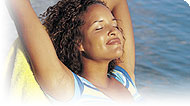Gluten Free
What does following a gluten-free diet mean? That you're embarking on an easy diet with a wide range of health-promoting effects. Instead of dwelling on what you’re giving up, consider that you’re going to enjoy a whole new world of delicious food options to meet your special dietary needs. You’ll be eating seasonally, choosing more fresh fruits and vegetables, focusing on meats, seafood, poultry, legumes, lentils, corn, and rice, and discovering fascinating ancient grains such as quinoa, amaranth, and millet. You’ll be able to eat potatoes, eggs, most cheeses, even chocolate (!)—and enjoy them without guilt because you’ll be taking good care of your body. In fact, you’ll probably end up eating—and feeling—better than ever!
Visit this page for more information about living Gluten Free
---
We carry a large variety of gluten free items, the brands listed below represent just some of the offerings we carry















More Diets
Anxiety

About This Condition
Anxiety describes any feeling of worry or dread, usually about events that might potentially happen. Some anxiety about stressful events is normal. However, in some people, anxiety interferes with the ability to function.
Some people who think they are anxious may actually be depressed. Because of all these factors, it is important for people who are anxious to seek expert medical care. Natural therapies can be one part of the approach to helping relieve mild to moderate anxiety.
Symptoms
Physical symptoms of anxiety include fatigue, insomnia, stomach problems, sweating, racing heart, rapid breathing, shortness of breath, and irritability.
Holistic Options
Reducing exposure to stressful situations can help decrease anxiety. In some cases, meditation, counseling, or group therapy can greatly facilitate this process.1
Acupuncture has been the subject of limited research as a therapy for anxiety. In an uncontrolled study, eight patients suffering from anxiety were treated with acupuncture three times per week for eight sessions. Six of the eight patients achieved good to moderate improvement.2 However, a trial of acupuncture treatment for anxiety associated with quitting smoking did not provide any evidence of benefit.3 A double-blind study of acupuncture for the treatment of anxiety associated with dental procedures reported that acupuncture and placebo were equally effective.4 Acupuncture remains unproven in the treatment of people with anxiety.
A form of counseling known as Cognitive-Behavioral Therapy (CBT) has been shown to be superior to placebo for managing the symptoms of panic disorder.5 In a controlled trial, six months of CBT produced a response rate of 39.5%, compared to only 13% in the placebo group. When combined with the tricyclic antidepressant drug imipramine (Tofranil®), response rates were even higher (57.1%). For long-term management of panic disorder, imipramine produced a superior quality of response, but CBT had more durability and was better tolerated.
Copyright © 2025 TraceGains, Inc. All rights reserved.
Learn more about TraceGains, the company.
The information presented by TraceGains is for informational purposes only. It is based on scientific studies (human, animal, or in vitro), clinical experience, or traditional usage as cited in each article. The results reported may not necessarily occur in all individuals. Self-treatment is not recommended for life-threatening conditions that require medical treatment under a doctor's care. For many of the conditions discussed, treatment with prescription or over the counter medication is also available. Consult your doctor, practitioner, and/or pharmacist for any health problem and before using any supplements or before making any changes in prescribed medications. Information expires December 2025.











